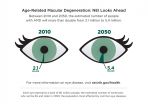(Press-News.org) People with a genetic predisposition for age-related macular degeneration (AMD) significantly increased their odds of developing the blinding eye disorder if they had a history of heavy smoking and consistently did not exercise or eat enough fruits and vegetables, according to an observational study of women funded by the National Eye Institute, part of the National Institutes of Health.
Eating a healthy diet and getting exercise have been shown in earlier studies to protect against AMD, a leading cause of vision loss among people age 50 and older. Findings from this latest study, conducted by a team of investigators at the University of Wisconsin-Madison, suggest that genetic and lifestyle factors may contribute to AMD in a synergistic way. The findings were published online in the journal Ophthalmology.
"If you have a family history of AMD, the good news is that the study findings suggest that there are things you can do to potentially lower your risk of developing AMD yourself," said Julie A Mares, Ph.D., of the University of Wisconsin-Madison. The study teams were led by Dr. Mares and Barbara A. Blodi, M.D., in the Department of Ophthalmology and Visual Sciences, in collaboration with investigators from the University of Iowa, Iowa City, and Oregon Health Science University, Portland.
The researchers studied the risk among women ages 50 to 79 years who had participated in the Carotenoids in Age-Related Eye Disease Study (CAREDS), an ancillary investigation of the much larger Women's Health Initiative, an observational study that has tracked the health-related behaviors and outcomes of more than 160,000 women since 1991.
For the current study, first author Kristin J. Meyers, Ph.D., and her team evaluated the diet and exercise patterns of 1663 women and categorized them into lowest-, moderate- and highest-risk groups. They also evaluated whether the women smoked and, if so, how many years they smoked a pack of cigarettes or more each day. They also assessed genetic data from the women to determine whether they carried known genetic risk factors for AMD. They looked most closely at an allele (version) of the complement factor H (CFH) gene that is known to be associated with greater AMD risk, probing whether the women had zero, one, or two copies of the allele.
A total of 337 women in the study developed AMD, of whom 91 percent had early-stage disease.
Among women with stable diets, those who carried two high-risk genetic alleles, smoked at least seven pack-years, and were in the highest-risk diet and exercise categories were more than four times more likely to have AMD compared to those women who did not have genetic risk factors and who ate a healthy diet and got at least 10 hours/week of light exercise (such as housework or walking at a pace you could sing to) or at least eight hours of moderate activity (such as brisk walking).
In addition to lifestyle contributions, vitamin D levels may play a synergistic role with genetic factors, according to the findings of another study by the same team involving 913 CAREDS participants. Amy E. Millen, Ph.D., that study's first author, found that blood levels indicating vitamin D deficiency (less than 12 ng/mL of 25 hydroxyvitamin D) were associated with a 1.8-fold increase in the odds of having AMD among women with no risk alleles, but a 6.7-fold increase in the odds of having AMD among women with two risk alleles, compared with women who had no genetic risk alleles and adequate levels of vitamin D. The findings of the vitamin D study, which was also funded by NEI, were published in JAMA Ophthalmology.
"The findings of both studies support the notion of biologic synergy. That is, that one's genes, lifestyle factors and nutrition all come together in a synergistic way to mediate inflammation, which is a key mechanism involved in AMD," said Dr. Mares. "There's a large body of evidence that unhealthy lifestyle habits are associated with inflammation and that CFH risk alleles augment inflammatory responses. Vitamin D is believed to suppress inflammation, which is thought to enhance the AMD disease processes both directly and indirectly."
INFORMATION:
Both studies were supported in part by NEI grants EY013018 and EY016886.
References:
Meyers KJ et al, "Joint associations of diet, lifestyle, and genes with age-related macular degeneration." Ophthalmology. Published online Sept. 8, 2015. http://dx.doi.org/10.1016/j.ophtha.2015.07.029
Millen AE et al, "Association between vitamin D status and age-related
macular degeneration by genetic risk," JAMA Ophthalmol. Published online August 27, 2015. doi:10.1001/jamaophthalmol.2015.2715
NEI leads the federal government's research on the visual system and eye diseases. NEI supports basic and clinical science programs that result in the development of sight-saving treatments. For more information, visit http://www.nei.nih.gov.
About the National Institutes of Health (NIH): NIH, the nation's medical research agency, includes 27 Institutes and Centers and is a component of the U.S. Department of Health and Human Services. NIH is the primary federal agency conducting and supporting basic, clinical, and translational medical research, and is investigating the causes, treatments, and cures for both common and rare diseases. For more information about NIH and its programs, visit http://www.nih.gov/.
NIH...Turning Discovery Into Health®
A new computational model developed by scientists from the University of Chicago could help improve the allocation of U.S. biomedical research resources. The tool, called the Research Opportunity Index (ROI), measures disparities between resources dedicated to a disease and its relative burden on society. ROI identifies diseases that receive a disproportionate share of biomedical resources, which represent opportunities for high-impact investment or for the realignment of existing resources. It is designed to provide an unbiased, data-driven framework to help scientific ...
In the midst of ferry boats, container ships and tourists crowding Seattle's Elliott Bay, young salmon are just trying to get a decent meal.
The fish hatch in the rivers and streams that feed into Puget Sound and almost immediately rely on eating small organisms near the shore, including in the heart of Seattle's commerce-filled waterfront.
Though salmon share the busy Elliott Bay waters with boats and barges, scientists suspect built-up, "armored" shorelines and large piers may be the main culprits disrupting fish habitat. These artificial structures block light and ...
Reminders to take medication, delivered to patients via an electronic pillbox, may be able to improve adherence to tuberculosis (TB) treatment. The findings, reported this week in PLOS Medicine, are the result of a cluster randomized controlled trial by Shiwen Jiang of the Chinese Centers for Disease Control & Prevention, Katherine Fielding, of the London School of Hygiene & Tropical Medicine, and colleagues.
The study randomized 36 districts in the provinces of Heilongjiang, Jiangsu, Hunan, and Chongqing, China to receive one of four approaches to tuberculosis case management: ...
Selective serotonin reuptake inhibitor (SSRI) use is modestly associated with violent crime, according to a study published this week in PLOS Medicine. The cohort study, by Seena Fazel from the University of Oxford, and colleagues, showed in subgroup analysis that this association was evident in participants aged 15-24, but not significant for individuals aged 25 and older.
SSRIs are widely prescribed, but inconclusive evidence links SSRI use with violent behavior. In this study, Fazel and colleagues compared the rate of violent crime while individuals were prescribed ...
Giving electronic reminders to tuberculosis (TB) patients in China can reduce the amount of medication doses they miss by half, according to new research published in PLOS Medicine.
Researchers from the London School of Hygiene & Tropical Medicine, UK, and the National Center for Tuberculosis Control and Prevention, China, conducted a trial with 4,173 patients from the provinces of Heilongjiang, Jiangsu, Hunan, and Chongqing. Patients either received text message reminders, an electronic medication monitor, both, or no reminders for their six month treatment period.
Patients ...
Measuring how religion affects a person's political attitudes and behavior can provide powerful insight to everyone from pundits to presidents.
Now there's a new strategy to gather better, more nuanced perspective on that religious influence than ever before, developed by University of Cincinnati researchers.
UC's Andrew Lewis and Stephen Mockabee presented research titled "Measuring Biblical Interpretation and Its Influence on Political Attitudes" at the American Political Science Association's annual meeting earlier this month in San Francisco. The association serves ...
MEDFORD/SOMERVILLE, Mass. (Sept. 15, 2015) -- Regenerative medicine using stem cells is an increasingly promising approach to treat many types of injury. Transplanted stem cells can differentiate into just about any other kind of cell, including neurons to potentially reconnect a severed spinal cord and repair paralysis.
A variety of agents have been shown to induce transplanted stem cells to differentiate into neurons. Tufts University biomedical engineers recently published the first report of a promising new way to induce human mesenchymal stem cells (or hMSCs, which ...
A quarter of a century ago, the physicist, physician and cell biologist Professor Thomas Jentsch and his research team opened up an entirely new field of research in the field of ion transport. Now the British journal "The Journal of Physiology"* has devoted a special section in its latest issue to his discovery. In this issue (DOI: 10.1113/jphysiol.2014.270043), Professor Jentsch, who leads a research group at the Max Delbrück Center for Molecular Medicine in the Helmholtz Association (MDC) and at the neighboring Leibniz-Institut für Molekulare Pharmakologie ...
New research from the USA suggests that college students are well aware that they should be personally responsible for their finances, including their card obligations, but this awareness rarely correlates with limiting the debts they accrue during their time in higher education. Details of the study are reported this month in the International Journal of Behavioural Accounting and Finance.
Lucy Ackert of the Department of Economics and Finance, at Kennesaw State University, in Georgia, and Bryan Church of the Scheller College of Business, at Georgia Tech, Atlanta, ...
The most obvious disadvantage of putting your data in the cloud is losing access when you have no internet connection. According to research publishes in the International Journal of Cloud Computing, this is where "dew" could help. Yingwei Wang of the Department of Computer Science, at the University of Prince Edward Island, Charlottetown, Canada, describes what he refers to as a "cloud-dew" architecture that offers an efficient and elegant way to counteract cloud downtime and communication difficulties.
In the world of cloud computing, users and organizations keep their ...

